Reduziere Neurodermitis
mit Sanubiom SkinCare Protect mit Phage Technology
Itching can affect the skin and mucous membranes all over the body. Depending on its severity, it can not only be a nuisance but can also significantly reduce quality of life.
As it often occurs as a symptom in connection with other illnesses, it is essential to investigate the cause. This is the only way to treat the unpleasant feeling and avoid secondary diseases .
The most important facts in brief:
Have you been plagued by itching and rashes for a long time, but don’t know the reasons behind them? Find out everything you need to know about itchy skin here. We explain what the causes are. We will also show you how you can go about relieving the itching.
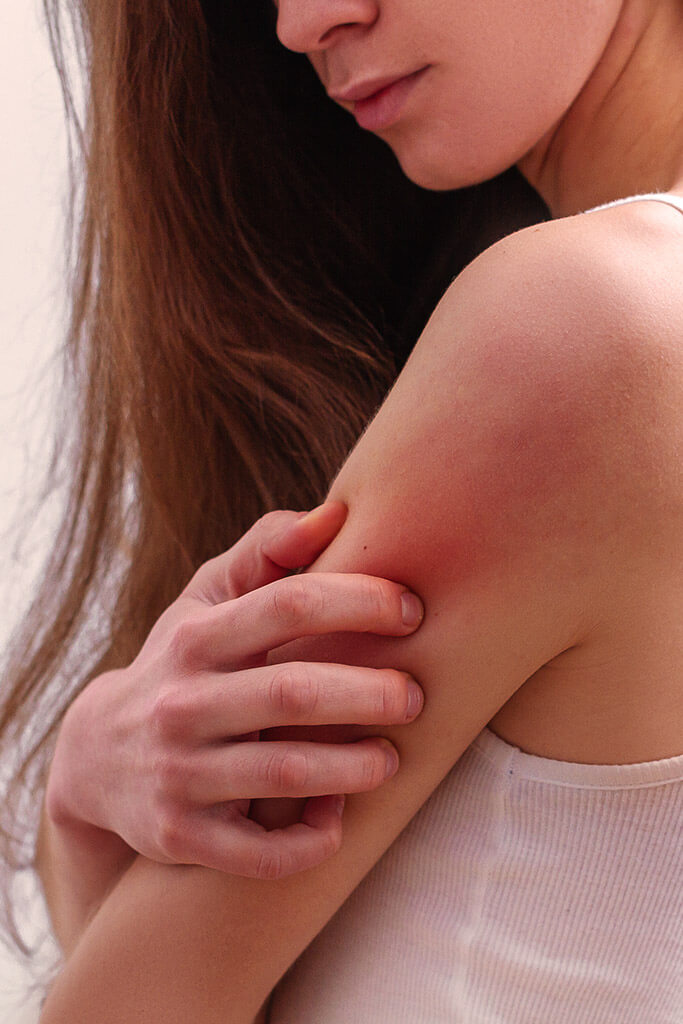
Pruritus (itching) in general is a sensory perception that most people find annoying and unpleasant.
The skin and mucous membranes are affected in all parts of the body, although the sensation can vary depending on the body region.
In the mild variant, it only occurs as a harmless slight tingling sensation. However, the symptoms can even include an unpleasant, painful burning sensation.
At best, the itching appears suddenly and disappears just as quickly. However, the symptoms often recur and persist over a longer period of time.
If this lasts longer than 6 weeks, it is referred to as chronic itching. In technical terms, it is referred to as chronic pruritus.
This is accompanied by various secondary damage to the skin, which results in a considerable reduction in quality of life.
If the skin is stressed by certain factors, these can trigger itching.
This is due to free nerve endings that lie directly under the surface of the skin and react to various stimuli and substances.
The messenger substance histamine, for example, plays an important role. This is stored in the mast cells of the skin and is released as a result of an allergic reaction, among other things.
The itch can be used to transmit signals from the nerves via the spinal cord to the brain, which convey certain information.
This creates the need to soothe the itchy area by scratching or rubbing it.
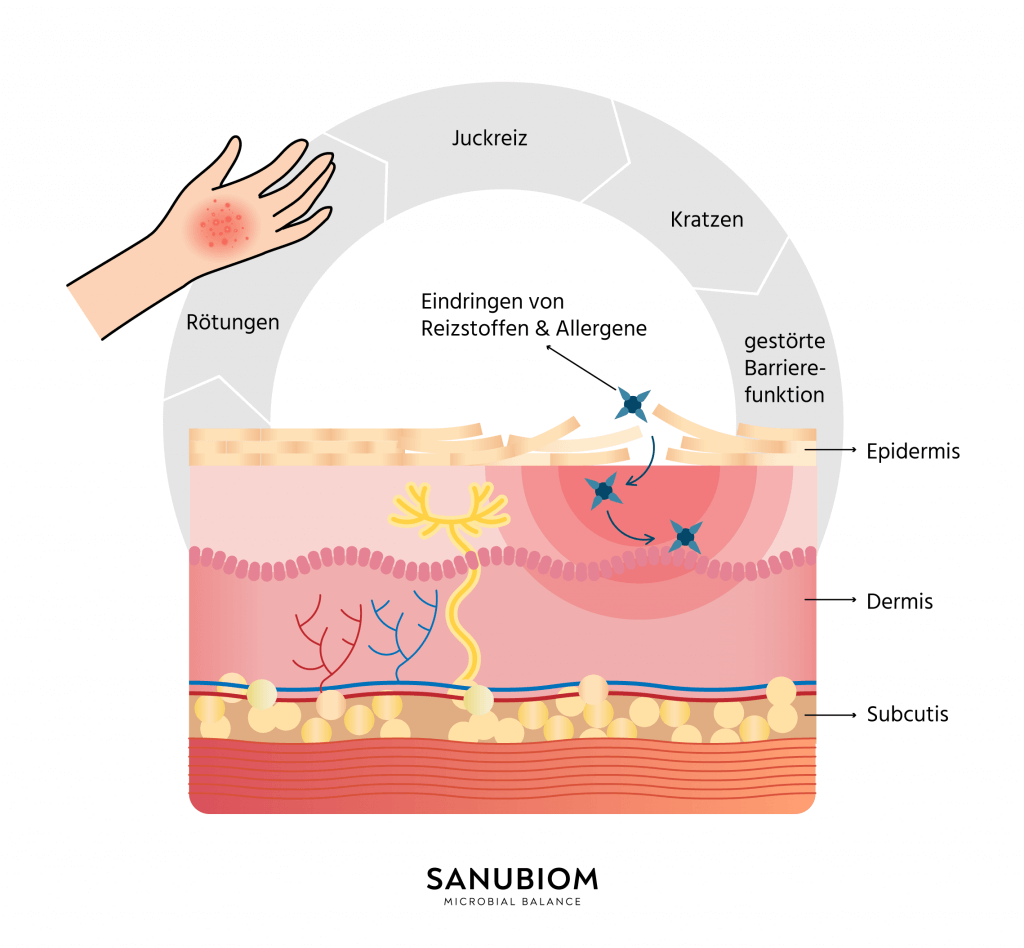
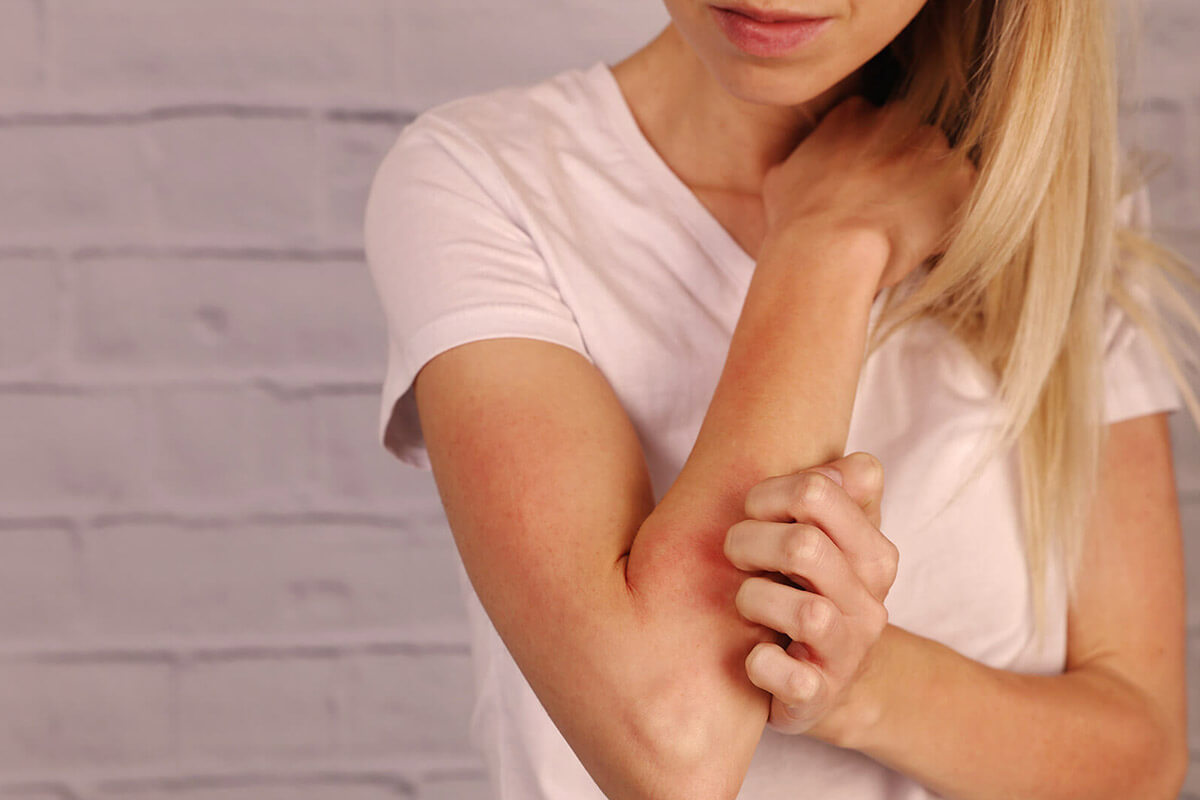
There are many different causes of very itchy skin. These include:
In addition to such external factors and physical illnesses, according to a study 1 by C. Shut and J. Kupfer, there are also links between itching and psychological causes.
According to this, various personality factors, psychological stress or the emotional state can be responsible for the unpleasant skin sensation.
The range of causes of itching is very wide and explains why it is so common in the general population.
Specific symptoms appear depending on the underlying cause of the itching.
Atopic dermatitis is typically accompanied by a rash. The extremely dry skin is often accompanied by severe itching all over the body, especially at night.
Hives (urticaria), on the other hand, is characterized by itching all over the body with a rash. The easily recognizable hives are accompanied by numerous wheals.
Patients with skin diseases such as psoriasis in particular are plagued by tingling and itching all over the body, which usually develops into chronic itching.
If the messenger substance histamine is released as a result of an allergic reaction, a rash and swelling of the affected area usually occur in addition to severe itching.
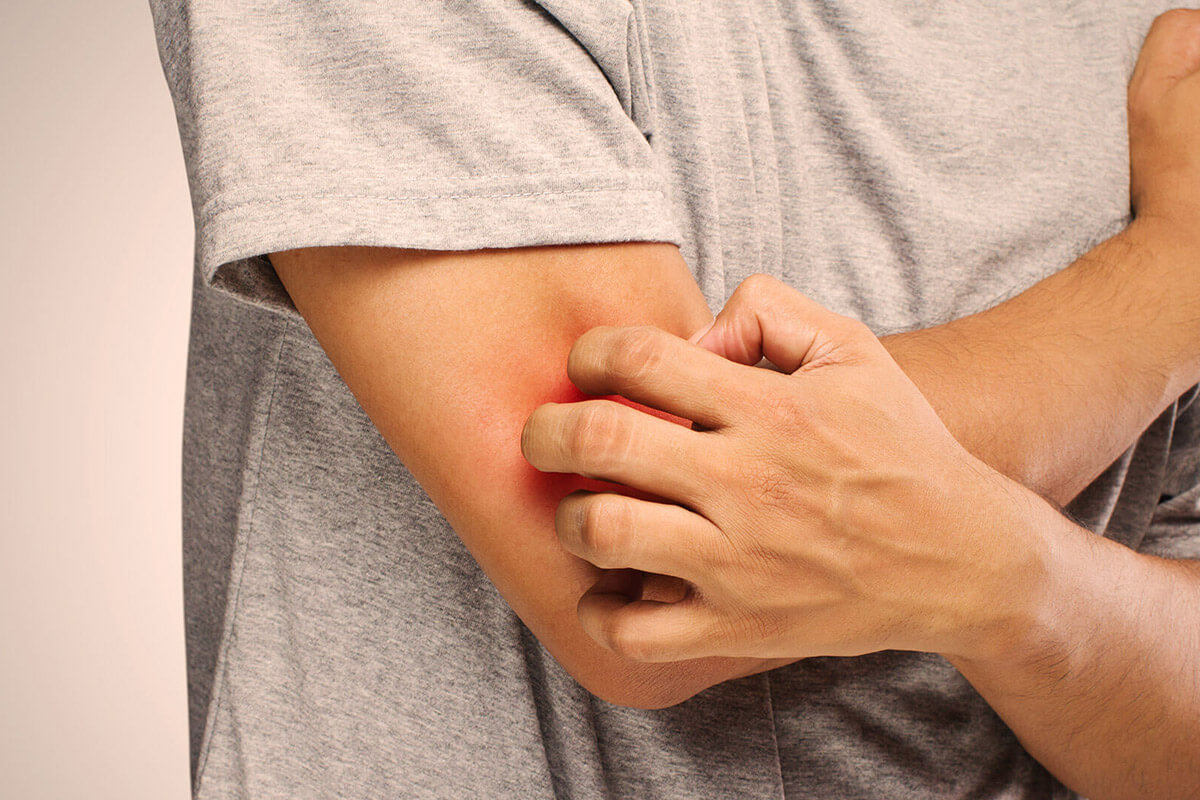

Even if you find it difficult, you should avoid any form of scratching, even if you have severe itching, because it catapults you into a vicious circle.
In this way, you only provoke skin injuries and trigger nerve stimuli that only lead to short-term relief and then increase the itching.
You can already take action against itchy skin by changing your own behavior. Certain household remedies can help to alleviate the rash and reduce the desire to scratch.
As it always makes more sense to treat the cause than just the symptoms, you should consult a dermatologist. The doctor will examine and clarify the reasons for the itching.
With a specific diagnosis, it is much easier to treat the symptoms specifically and reduce the itching and the rash.
If you prefer to care for and treat your skin with natural products, you can also use tried-and-tested home remedies for itching.
The following home remedies can provide relief:
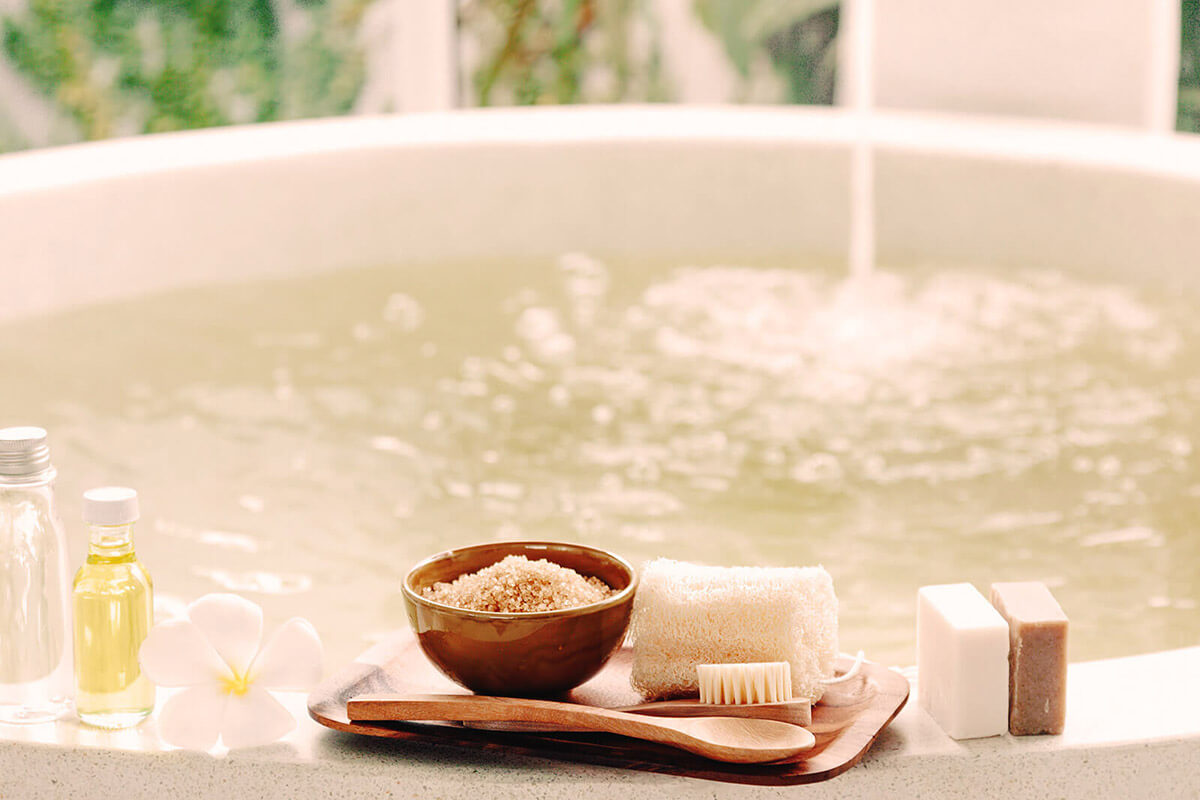
If you suffer from itching, you know how unpleasant and annoying this condition can be. An antipruritic ointment can provide quick and effective relief to help you feel comfortable again.
There are several types of ointments for itching on the market, including over-the-counter and prescription options. It is important to determine the cause of the itching before choosing an ointment to ensure you are using the right product.
An ointment for itching can contain various ingredients that work differently depending on the type of itching and the skin condition. Some common ingredients in ointments for itching include cortisone, menthol, calamine, camomile and aloe vera.
When looking for an ointment for itching, it is important to pay attention to the quality of the ingredients. Only use ointments that are made by trusted brands and that dermatological experts would recommend.
Another important consideration when choosing an ointment for itching is whether you are allergic to certain ingredients. You should therefore always check the list of ingredients to ensure that you are not at risk of an allergic reaction.
In addition to using an ointment for itching, you could also take some simple steps to reduce the itching. You should avoid tight clothing and dry skin, wear loose clothing made of breathable materials and avoid hot baths or showers.
There are many different types of anti-itch creams on the market, which can have different effects depending on the cause of the itching and the type of skin discomfort. Some creams contain ingredients such as hydrocortisone or cortisone, which can help with inflammatory skin conditions, while other creams contain soothing ingredients such as aloe vera or camomile, which have a calming effect on the skin.
When using an anti-itch cream, it is important to read the instructions on the packaging carefully and only use the cream as directed. You should not exceed the recommended dosage or frequency of use to avoid possible side effects.
If you are allergic to certain ingredients or have sensitive skin, you should choose a cream that has been specially developed for sensitive skin and is free from irritating ingredients such as fragrances or alcohol.
Cooling the skin is an effective immediate measure for itching. This is because the cold numbs the skin, or rather the nerve endings located there, for a moment.
Suitable products for cooling itchy skin are:
Dry skin in particular can cause itching. Daily care with the right creams and lotions can help the skin. Ceramides can strengthen the skin, urea can moisturize it and licorice root can soothe it.
It is best to avoid certain other ingredients: Fragrances can irritate the skin and alcohol dries out the skin.
Even if the urge is hard to resist: don’t scratch itchy skin!
The resulting scratching of the skin makes it vulnerable. It becomes additionally irritated and may itch even more as a result – creating a vicious circle of itching and scratching.
Alternatively, the skin can be stroked, gently pressed or lightly pinched. This also provides some relief without causing too much damage.
Appropriate personal hygiene and skin care is an important factor in reducing itching.
Strong surfactants may cleanse the skin “squeaky clean”, but they dry it out. Mild sugar surfactants are preferable. Products with a moisturizing effect, such as shower oils, are also ideal for body care.
Stress and inner tension affect your skin. Itching feels stronger as a result.
Increased scratching and subsequent skin injuries due to stress can be the result. Give yourself the peace and quiet you need – for example through yoga, meditation or time for your hobby.
If nothing helps against the itching in the long term, a doctor should be contacted. It may be due to a disease such as an allergy or a metabolic disorder.
Itching can have many causes, including the following spectrum:
An iron deficiency can be a cause of itching all over the body. In addition, an iron deficiency leads to dry skin, paleness and cracks at the corners of the mouth.
The causes of dry and itchy skin can be numerous. Reduced sebum production, a lack of skin lipids and natural moisturizing factors such as urea upset the skin barrier and the protective function no longer works properly. SkinCare Plus helps to rebuild the skin’s natural protection.
Possible causes include inflammation, medication, allergies, diseases of the liver, gall bladder or kidneys, diabetes, tumors, a slipped disc, parasites and neurological diseases. In many cases, the cause of chronic itching is not recognized or only recognized very late.
If an organ is responsible for the itching, the itching is usually due to a bile blockage. Liver disease (intrahepatic) or a blockage of the external bile ducts (extrahepatic) may be responsible for the bile blockage.
A simple home remedy for itching is black tea, as the tannins contained in black tea are said to strengthen the protective layer of your skin. You can either drink the tea or soak a cloth in it and dab the affected areas of skin.
The appearance of our skin acts as a filter to our inner self. One of the most common triggers for itching and tingling all over the body is chronic stress.
It becomes dangerous when the body becomes accustomed to the exceptional state and the regularly released substances such as cortisol and histamine permanently damage the body and ultimately the skin.
Many patients with diabetes suffer from dry skin. This can cause severe itching.
A feeling of tightness, cracked, dry and itchy skin can indicate a lack of the trace element zinc.
Excessive sugar consumption throws the sensitive regulation out of balance. A consistently high blood sugar level thus impairs our metabolism and immune system and triggers inflammatory processes. This can be another trigger for itching.
A tried and tested home remedy for itching is black tea: steep 2 tea bags in 200 milliliters of hot water and then leave to cool. Apply the tea to a cloth and leave on for 10 to 15 minutes. The tannins it contains also have an anti-inflammatory effect.
The causes of itching can be many and varied. These include sun or contact allergies, psoriasis or a fungal disease. However, itching is also a symptom of stress or systemic diseases such as kidney failure or diabetes.
Quick relief: Cool, moist compresses with yogurt or a little vinegar can help to relieve sudden, severe itching. Black tea can also help against itching. To prevent the skin from drying out, however, you should apply cream to the skin after every wet wrap.